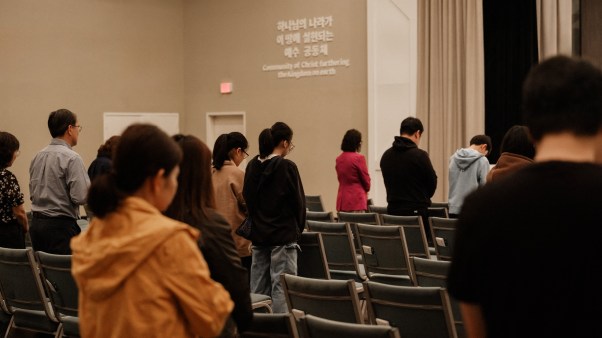For those who thought the “proofs” for God had seen their day, it may come as a surprise that theology in Europe is devoting a lot of attention these days to those very proofs. The question is being seriously asked whether the fairly wholesale scrapping of the “proofs” in the years since the great Immanuel Kant put his logical axe to them was really a responsible move.
True, the First Vatican Council held steady to the notion that the Creator God could be known by the light of natural reason through inference from created reality. And the Catholic anti-modernism oath issued in 1910 still insisted on the possibility of proving God’s existence. But since then the “proofs” have gradually faded from theological horizons.
Modern thinkers became convinced that the “proofs,” dating as they did from the Middle Ages, simply had no power to persuade men and certainly offered no rational bulwark against atheism. Apologetics as a whole was discredited. Faith in God, it was assumed, could never be a last step in a logical argument, never the capstone in a theological wall built by reason. Karl Barth more than anyone else brought the “proofs” into disrepute with his attack on them as an arrogant human effort to blaze a trail from man to God.
Things have changed during the last decade. Article after article has appeared to pose the question whether we were not being too simplistic in our No to natural theology. Ernst Kinder raised what he called, in 1963, the enormously complicated problem of a natural experience of God. Later, Pannenberg spoke more positively about what he called “the unconquered natural theology.” This, and much more, occurred, despite Barth’s christologically honed anti-natural-theology axe, and despite the influence of his famous “Apart from Christ, I would be an atheist.”
No one has made a pitch for a return to the same rationalism that shadowed the old apologetics. The concept of God in the old natural theology was too vague, too vacuous, to interest today’s theologians. Not many, if any, are fascinated by the idea of God as a first cause or a first mover. But the question of the experience of God in nature and history does fascinate.
Is God knowable only in the narrow light of Jesus Christ? Or is he revealed in creation too, in the works of his hands? Are there hints of the Creator of heaven and earth scattered about for all to see? Did not Paul, in spite of his concentration on the revelation of God in Jesus Christ, write that God’s eternal power and Godhead have been visible to the eye of reason ever since the world began (Rom. 1:20)? And is it not this witness that kept natural theology alive, even in its discredited forms?
Along with a new interest in the question of reason’s exposure to God’s reality comes a new interest in non-Christian religions. Roman Catholic theologians have led the way here, but younger Protestant theologians like Pannenberg are not far behind. Must we think of the non-Christian religions simply as the work of the devil? Or are there signs of God’s presence among men to be seen here too?
We are observing an increasing disinclination to think of faith in God as an irrational leap, an event of which nothing more can be rationally said than what the cured blind man said: “One thing I know, that I was blind and now I can see” (John 9:25). There is a missionary dimension, too, in the current unwillingness to isolate faith from religion. To view the other religions as void of all that relates to faith is to empty Christian faith of courage to witness to God in an atheistic world. Faith, it is said, is not an irrational event, not a matter of feeling or mystical experience alone; Christian faith is a responsible, meaningful faith that deals in sober truth (Acts 26:25).
But if we are not engaged here with a restoration of the old natural “proofs,” what do we have on our hands? The answer is: We have an affirmation that the question of God’s reality comes as an answer to the human situation. God comes to men in their open, creaturely existence, in their concern and readiness for the future (hope), and in their radical questioning of life. Must we not suppose, it is suggested, that God really does come as the answer to all these natural questions?
We may recall Feuerbach’s confident “discovery” that all religion was a projection of human thoughts and human needs. We may recall Freud’s proclamation of the same thesis in his famous The Future of an Illusion. But they did not have the last word. Today, Feuerbach is being read again and written about again. But the interest is motivated, not by agreement with his thought, but by a keen concern to rethink the relation between seeking and finding, between asking and answering.
Thus despite the epitaphs written over the “proofs” we are seeing today a vigorous new effort to pull Christian faith out of what is called its “ghetto” status and to push it smack into the world again. These theologians want nothing of a subjective, “private property” religion; they want to go into the world with a confession of God that accepts him as the One who impinges on the lives of all men and is the answer to their deepest questions. Herein is the motive for their disaffection with Barth’s Christocentrism and their eagerness to tie in their confession of Christ with that of the creating God who is still at work in the world.
The new situation is not ripe for generalizations either of approval or of rejection. We keep hearing the voice of Jesus Christ telling us that no one comes to the Father except through him (John 14:6). We will have to wait and see whether the new direction can stay clear of the old rationalism and avoid the vague categories of the old natural theology.
I must admit to some disquiet here. There is real courage in this demand to enter the world with a reasonable stance. But questions surround the effort, questions provoked by the fact that the Gospel, after all, is not according to men (Gal. 1:11), not even religious men, and that the Gospel is, after all, a scandal to natural thought.
Only if we keep these facts clearly in front of us can we busy ourselves fruitfully with the real issues about human questions and God’s answers. If we ignore Paul’s own insights into the message of the Cross, or if we merely shave away its offensiveness, we run a real risk of entering the world with another reasonable idea that is basically powerless to penetrate modern atheism. After all, that world has some ideas of its own to compete with the Christian interpretation of man’s questions and answers.
G. C. BERKOUWER










